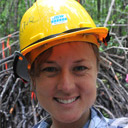
Scientists often tend to privilege presenting their research at conferences, to other scientists, sometimes to policy-makers or the media.
But in remote villages in the Ecuadorian Amazon, scientists from the Centre for International Forestry Research (CIFOR) are presenting to a different audience – they are sharing with those communities the results of a study they conducted there about Ecuador’s domestic timber market.
“It’s ethical, and important, to return this information to the local people,” says CIFOR researcher Elena Mejia.
“But it’s very rare that scientists actually do this here in Amazonia.”
Mejia spent several months visiting villages in Ecuador’s Orellana and Napo provinces last year. She conducted surveys and interviews for the Pro-Formal project, which is examining at the dynamics of formal and informal domestic timber markets in five countries, including Ecuador.
“It’s not always possible to return the results – but we need to look for ways that we can make it happen, whether it’s through a workshop, communications materials like videos, or even a simple meeting,” Mejia says.
That’s because this kind of research can frequently yield insights that are valuable for communities.
“People in these communities have a lack of access to information,” says Ayme Muzo, another CIFOR researcher working on the project.
“The villages are remote, there’s no mobile phone signal, the roads are bad, and most communities, especially the indigenous ones, are far from the towns.”
“So we hold these workshops to share our research findings, highlighting the information that could be useful for them.”
In a riverside Kichwa community in Napo province, Muzo and Mejia are hosting a workshop outside, on a covered basketball court. Not all of the community have turned up; but those who are there seem to find the session useful.
When you ask people what the community does, they always say they do agriculture – yet a significant proportion of their income comes from forest products
In each session, the scientists describe some of the overall findings of the study, as well as those relevant to the particular community.
As is the case in many communities, the information they’re most interested in from this study concerns the prices fetched by timber downstream.
“People here didn’t know how much the timber costs on the market overseas, how much it costs in Tena, and how much it costs in the communities,” says community elder Domingo Grefa.
“People here have been tricked by those outside. This is good information.”
While the communities have organized to sell their agricultural produce for better prices, there is no such community organization for timber, Muzo says.
“So this information could be very important, so that they see they need to work together to get better prices.”
Another useful finding from the Pro-Formal study was that the communities do depend significantly on the forest: on average, for indigenous families in Napo that harvest wood, timber makes up 17 per cent of their income.
Eighteen per cent of all families surveyed in the province (including non indigenous settlers) that faced an economic crisis of some kind, harvested wood products to make extra money, the study found.
“When you ask people what the community does, they always say they do agriculture – yet a significant proportion of their income comes from forest products. So this information helps them to realise that, and consider all of the different strategies they use,” Mejia says.
Win-win
Holding these sessions also allows the scientists to receive feedback on their results, giving new insights and creating a circular process rather than a linear one, Mejia says.
And it’s also an important part of building relationships between scientists and the communities.
“It can be hard to explain to people in rural areas why we do this kind of research. So returning and sharing the results helps communities understand the relevance of scientific investigations, and how the information that we collect from them is useful – for them and for us,” says Mejia.
“It’s about creating trust. And it creates a precedent for other studies, other researchers, so that it will be easier conduct scientific work here in the future.”
And although some people in some communities remain sceptical about the value of information – as opposed to the more concrete benefits given by NGOs – the scientists say communities generally respond well to the workshops.
In the village in Napo, Domingo Grefa says he’s learned a lot.
“This information, I tell you, it’s the first time I’ve heard anything about this, and I’ve been here for 40 years. About the prices, all this information that we’ve heard today – this information just didn’t exist.”
For more information on issues discussed in this article, please contact Elena Mejia at k.mejia@cgiar.org
The Pro-Formal project (Policy and regulatory options to recognise and better integrate the domestic timber sector in tropical countries) is funded by the European Commission and forms part of the CGIAR Research Program on Forests, Trees and Agroforestry.
We want you to share Forests News content, which is licensed under Creative Commons Attribution-NonCommercial-ShareAlike 4.0 International (CC BY-NC-SA 4.0). This means you are free to redistribute our material for non-commercial purposes. All we ask is that you give Forests News appropriate credit and link to the original Forests News content, indicate if changes were made, and distribute your contributions under the same Creative Commons license. You must notify Forests News if you repost, reprint or reuse our materials by contacting forestsnews@cifor-icraf.org.














